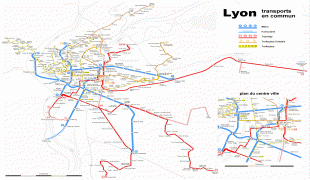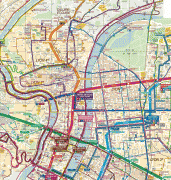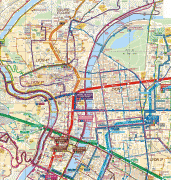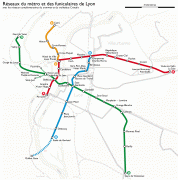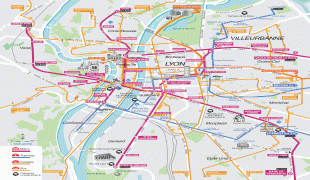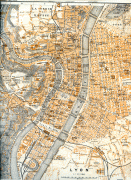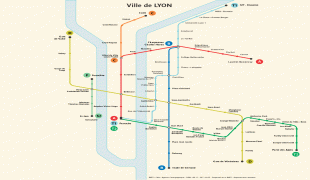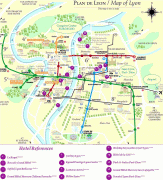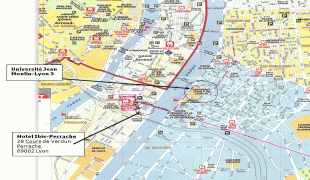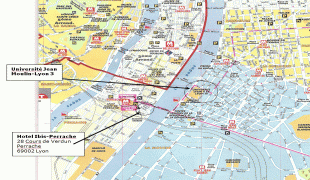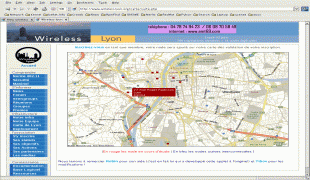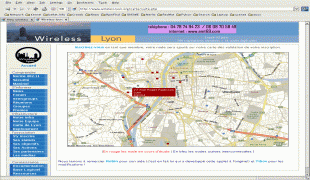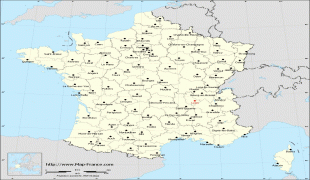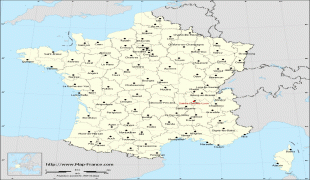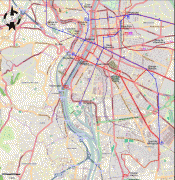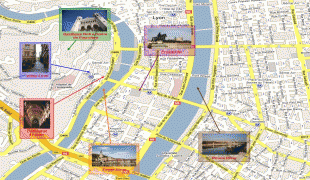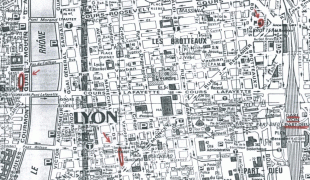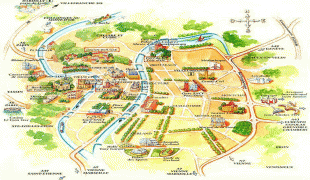Lyon
Lyon, also spelt in English as Lyons, is the third-largest city of France. It is located at the confluence of the rivers Rhône and Saône, to the northwest of the French Alps, 391 km southeast of Paris, 278 km north of Marseille, 113 km southwest of Geneva, 50 km northeast of Saint-Étienne.
The City of Lyon had a population of 522,228 in 2020 within its small municipal territory of 48 km², but together with its suburbs and exurbs the Lyon metropolitan area had a population of 2,293,180 that same year, the second most populated in France. Lyon and 58 suburban municipalities have formed since 2015 the Metropolis of Lyon, a directly elected metropolitan authority now in charge of most urban issues, with a population of 1,416,545 in 2020. Lyon is the prefecture of the Auvergne-Rhône-Alpes region and seat of the Departmental Council of Rhône (whose jurisdiction, however, no longer extends over the Metropolis of Lyon since 2015).
The capital of the Gauls during the Roman Empire, Lyon is the seat of an archbishopric whose holder bears the title of Primate of the Gauls. Lyon became a major economic hub during the Renaissance. The city is recognised for its cuisine and gastronomy, as well as historical and architectural landmarks; as such, the districts of Old Lyon, the Fourvière hill, the Presqu'île and the slopes of the Croix-Rousse are inscribed on the UNESCO World Heritage List. Lyon was historically an important area for the production and weaving of silk. Lyon played a significant role in the history of cinema since Auguste and Louis Lumière invented the cinematograph there. The city is also known for its light festival, the Fête des Lumières, which begins every 8 December and lasts for four days, earning Lyon the title of "Capital of Lights".
Economically, Lyon is a major centre for banking, chemical, pharmaceutical and biotech industries. The city contains a significant software industry with a particular focus on video games; in recent years it has fostered a growing local start-up sector. The home of renowned universities and higher education schools, Lyon is the second-largest student city in France, with a university population of nearly 200,000 students within the Metropolis of Lyon. Lyon hosts the international headquarters of Interpol, the International Agency for Research on Cancer, as well as Euronews. According to the Globalization and World Rankings Research Institute, Lyon is considered a Beta city,. It ranked second in France and 40th globally in Mercer's 2019 liveability rankings.
The City of Lyon had a population of 522,228 in 2020 within its small municipal territory of 48 km², but together with its suburbs and exurbs the Lyon metropolitan area had a population of 2,293,180 that same year, the second most populated in France. Lyon and 58 suburban municipalities have formed since 2015 the Metropolis of Lyon, a directly elected metropolitan authority now in charge of most urban issues, with a population of 1,416,545 in 2020. Lyon is the prefecture of the Auvergne-Rhône-Alpes region and seat of the Departmental Council of Rhône (whose jurisdiction, however, no longer extends over the Metropolis of Lyon since 2015).
The capital of the Gauls during the Roman Empire, Lyon is the seat of an archbishopric whose holder bears the title of Primate of the Gauls. Lyon became a major economic hub during the Renaissance. The city is recognised for its cuisine and gastronomy, as well as historical and architectural landmarks; as such, the districts of Old Lyon, the Fourvière hill, the Presqu'île and the slopes of the Croix-Rousse are inscribed on the UNESCO World Heritage List. Lyon was historically an important area for the production and weaving of silk. Lyon played a significant role in the history of cinema since Auguste and Louis Lumière invented the cinematograph there. The city is also known for its light festival, the Fête des Lumières, which begins every 8 December and lasts for four days, earning Lyon the title of "Capital of Lights".
Economically, Lyon is a major centre for banking, chemical, pharmaceutical and biotech industries. The city contains a significant software industry with a particular focus on video games; in recent years it has fostered a growing local start-up sector. The home of renowned universities and higher education schools, Lyon is the second-largest student city in France, with a university population of nearly 200,000 students within the Metropolis of Lyon. Lyon hosts the international headquarters of Interpol, the International Agency for Research on Cancer, as well as Euronews. According to the Globalization and World Rankings Research Institute, Lyon is considered a Beta city,. It ranked second in France and 40th globally in Mercer's 2019 liveability rankings.
Map - Lyon
Map
Country - France
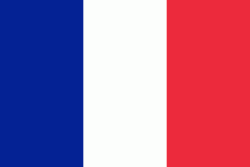 |
 |
| Flag of France | |
Inhabited since the Palaeolithic era, the territory of Metropolitan France was settled by Celtic tribes known as Gauls during the Iron Age. Rome annexed the area in 51 BC, leading to a distinct Gallo-Roman culture that laid the foundation of the French language. The Germanic Franks formed the Kingdom of Francia, which became the heartland of the Carolingian Empire. The Treaty of Verdun of 843 partitioned the empire, with West Francia becoming the Kingdom of France in 987. In the High Middle Ages, France was a powerful but highly decentralised feudal kingdom. Philip II successfully strengthened royal power and defeated his rivals to double the size of the crown lands; by the end of his reign, France had emerged as the most powerful state in Europe. From the mid-14th to the mid-15th century, France was plunged into a series of dynastic conflicts involving England, collectively known as the Hundred Years' War, and a distinct French identity emerged as a result. The French Renaissance saw art and culture flourish, conflict with the House of Habsburg, and the establishment of a global colonial empire, which by the 20th century would become the second-largest in the world. The second half of the 16th century was dominated by religious civil wars between Catholics and Huguenots that severely weakened the country. France again emerged as Europe's dominant power in the 17th century under Louis XIV following the Thirty Years' War. Inadequate economic policies, inequitable taxes and frequent wars (notably a defeat in the Seven Years' War and costly involvement in the American War of Independence) left the kingdom in a precarious economic situation by the end of the 18th century. This precipitated the French Revolution of 1789, which overthrew the Ancien Régime and produced the Declaration of the Rights of Man, which expresses the nation's ideals to this day.
Currency / Language
| ISO | Currency | Symbol | Significant figures |
|---|---|---|---|
| EUR | Euro | € | 2 |
| ISO | Language |
|---|---|
| EU | Basque language |
| BR | Breton language |
| CA | Catalan language |
| CO | Corsican language |
| FR | French language |
| OC | Occitan language |







